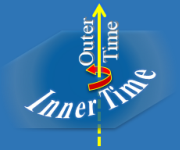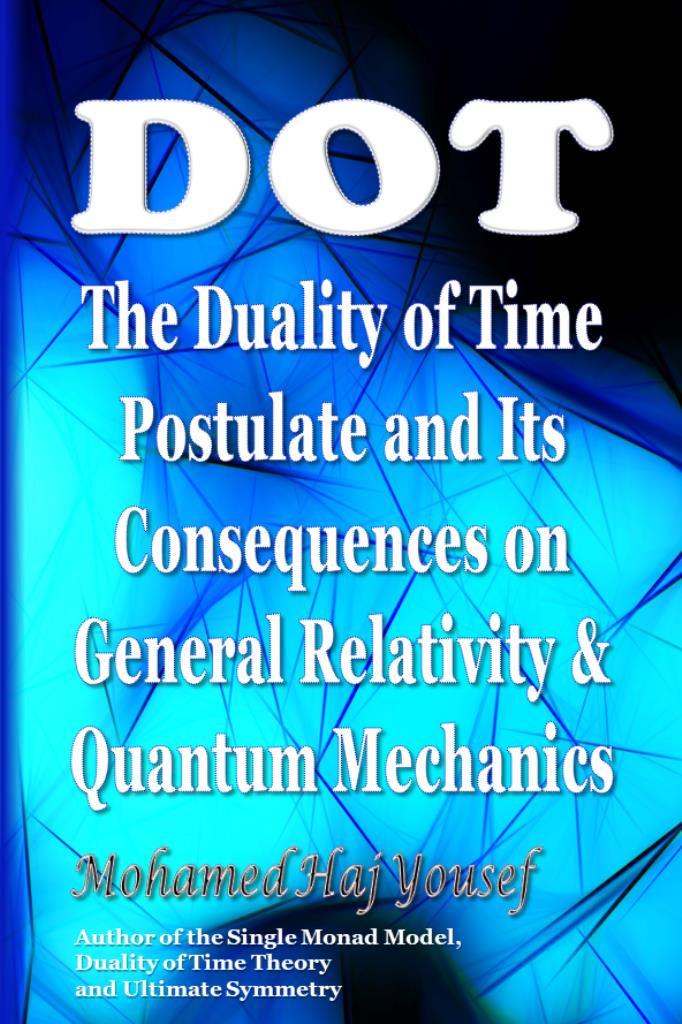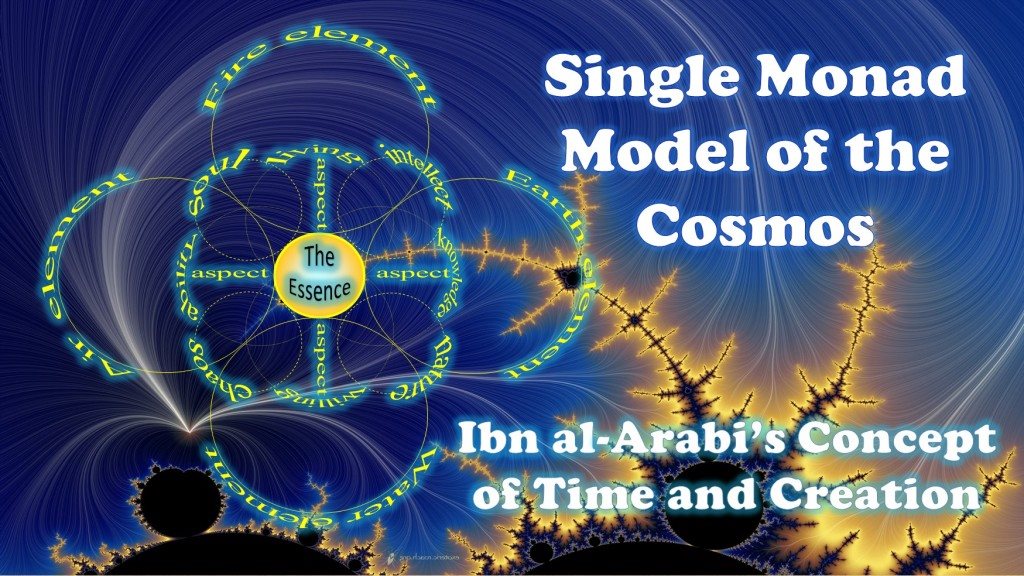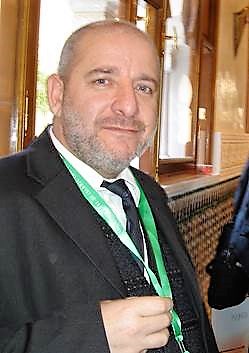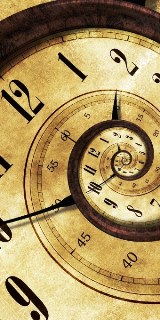Most of these introductory articles are exracted from Volume I of the Single Monad Model of the Cosmos: Ibn al-Arabi's View of Time and Creation... more on this can be found here.
Time in Philosophy and Science, Introduction
Everybody feels time, and most people do not question it because they experience everyday and it is so familiar (Fraser 1987: 17-22). But if we want to understand the nature of time we have to answer many basic questions such as:
· What really is time?
· Can we stop it?
· Can we reverse it?
· Is the flow of time universal or is it related to the observer?
· When was the beginning of time, and does it have an end?
· Does time exist objectively, or is it only a construct of our imagination?
· What is the relationship between time and space?
· What is the structure of time?
· Is time continuous or discrete?
· What does the word 'now' or 'moment' mean?
· Why does time move into the past?
· What is the reality of the future?
These and many other similar questions have been the subject of philosophy, physics and cosmology for many centuries, with little progress in finding convincing answers. The question: 'What is time?' is more like the question: 'What is love?', because it is something that everybody can feel it, but no one can give an exact definition of it. If you ask this question to many people, you will certainly get as many answers. St. Augustine, in his Confessions, asks, 'What is time?' When no one asks him, he knows; when someone asks him, however, he doesn't know (EP, 'Time', VIII, 126).
The understanding of time was very important for early man from both the practical view, where he needed to anticipate major events such as floods and harvest time, and from the philosophical view, which is based on sheer curiosity and love of knowledge. Many religions and ancient philosophies, therefore, have tried to answer some questions about time. Some of these religions and philosophies consider time as circular with no beginning or end, some consider it as linear with infinite extension in the past and in the future, and others consider it as imaginary, while real existence is for motion or moving bodies only.
The concept of time is necessary when we ask about the chronological order of things and the duration of events. And because our life is full of events of all types, so time has its signature in all aspects of life. Some examples are: the aging process in biology, timekeeping in mechanics, the arrow of time and entropy in thermodynamics, and the radically varying psychical time that one feels when waiting for something or in other circumstances. Therefore, in order to understand the reality of time, one needs to explore many closely related fields like physics, biology, psychology and cosmology.
In recent centuries, with the revolutionary new concepts in physics and cosmology in addition to modern technology, increasing accuracy of time became very important because it is the reference for the extremely complicated motions - of the different parts of a machine for example - that have to work together in coherence. The critical importance of timing events both on earth and in space was enhanced by precise time-keeping machines like electronic clocks, atomic clocks, and pulsars which are fast-rotating stars that emit short radio pulses at regular intervals with extremely high precision. But despite the new abstract concepts about time like 'time travel' and the 'curvature of time' brought about by the theory of Relativity, our modern concept of time has usually remained quite practical because everything has to be done according to the clock. In fact, the modern theories of physics and cosmology have added more questions and paradoxes about time than they answered (Grünbaum 1971: 195-230).
In general we can detect two major opposing views in the philosophy of time:
1- the rational (realistic) view based on the physical understanding of the world,
2- the idealistic (perhaps apparently 'irrational') view based on metaphysics.
Rationalists believe that the mind is the most powerful force of man and is able to understand everything in the world, while the irrationalists consider the world, including time, as something beyond the capabilities of our minds. For the idealist, nothing, including time, exists independent of the mind. Therefore the idealist believes that time is a construct of our mind and doesn't have a separate existence.
... Space Transcendence Read this short concise exploration of the Duality of Time Postulate: DoT: The Duality of Time Postulate and Its Consequences on General Relativity and Quantum Mechanics ...
... en someone asks him, however, he doesn't know (EP, 'Time', VIII, 126). The understanding of time was very important for early man from both the practical view, where he needed to anticipate MAJOR EVENTS such as floods and harvest time, and from the philosophical view, which is based on she ...
... re of time' brought about by the theory of Relativity, our modern concept of time has usually remained quite practical because everything has to be done according to the clock. In fact, the MODERN THEORIES of physics and cosmology have added more questions and paradoxes about time than the ...
... iew, where he needed to anticipate major events such as floods and harvest time, and from the philosophical view, which is based on sheer curiosity and love of knowledge. Many religions and ANCIENT PHILOSOPHIES , therefore, have tried to answer some questions about time. Some of these relig ...
... xtension in the past and in the future, and others consider it as imaginary, while real existence is for motion or moving bodies only. The concept of time is necessary when we ask about the CHRONOLOGICAL ORDER of things and the duration of events. And because our life is full of events of ...
... n space was enhanced by precise time-keeping machines like electronic clocks, atomic clocks, and pulsars which are fast-rotating stars that emit short radio pulses at regular intervals with EXTREMELY HIGH precision. But despite the new abstract concepts about time like 'time travel' and th ...
... nd the radically varying psychical time that one feels when waiting for something or in other circumstances. Therefore, in order to understand the reality of time, one needs to explore many CLOSELY RELATED fields like physics, biology, psychology and cosmology. In recent centuries, with th ...
... ck. In fact, the modern theories of physics and cosmology have added more questions and paradoxes about time than they answered (Grünbaum 1971: 195-230). In general we can detect two major OPPOSING VIEWS in the philosophy of time: 1- the rational (realistic) view based on the physical und ...
... achines like electronic clocks, atomic clocks, and pulsars which are fast-rotating stars that emit short radio pulses at regular intervals with extremely high precision. But despite the new ABSTRACT CONCEPT s about time like 'time travel' and the 'curvature of time' brought about by the the ...
... nderstand everything in the world, while the irrationalists consider the world, including time, as something beyond the capabilities of our minds. For the idealist, nothing, including time, EXISTS INDEPENDENT of the mind. Therefore the idealist believes that time is a construct of our mind ...
... ith the revolutionary new concepts in physics and cosmology in addition to modern technology, increasing accuracy of time became very important because it is the reference for the extremely COMPLICATED MOTIONS - of the different parts of a machine for example - that have to work together i ...
... mic clocks, and pulsars which are fast-rotating stars that emit short radio pulses at regular intervals with extremely high precision. But despite the new abstract concepts about time like ' TIME TRAVEL ' and the 'curvature of time' brought about by the theory of Relativity, our modern conce ...

